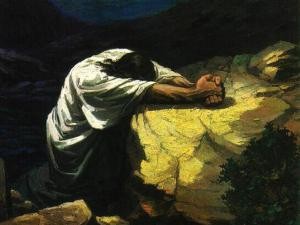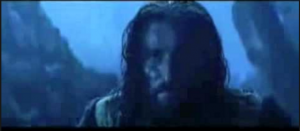“Double agony” – this unusual phrase occurs in the hymn “Praise to the Holiest in the Height,” by John Henry Newman, which we sang at Mount Calvary the first Sunday of Lent:
O generous love! that he who smote
in Man, for man, the foe,
the double agony in Man
for man should undergo;And in the garden secretly,
and on the Cross on high,
should teach his brethren, and inspire
to suffer and to die.
Jesus who is true God and true man, undergoes for the human race the “double agony,” the one in the garden and the one on the cross.
Newman placed equal emphasis on Jesus’ Agony in the Garden and on His Crucifixion as central to understanding the work of redemption. In his Discourse 16, Newman explains what the Agony in the Garden meant for Jesus:
“And now, my brethren, what was it He had to bear, when He thus opened upon His soul the torrent of this predestinated pain? Alas! He had to bear what is well known to us, what is familiar to us, but what to Him was woe unutterable. He had to bear that which is so easy a thing to us, so natural, so welcome, that we cannot conceive of it as of a great endurance, but which to Him had the scent and the poison of death—He had, my dear brethren, to bear the weight of sin; He had to bear your sins; He had to bear the sins of the whole world.
Sin is an easy thing to us; we think little of it; we do not understand how the Creator can think much of it; we cannot bring our imagination to believe that it deserves retribution, and, when even in this world punishments follow upon it, we explain them away or turn our minds from them. But consider what sin is in itself; it is rebellion against God; it is a traitor’s act who aims at the overthrow and death of His sovereign; it is that, if I may use a strong expression, which, could the Divine Governor of the world cease to be, would be sufficient to bring it about. Sin is the mortal enemy of the All-holy, so that He and it cannot be together; and as the All-holy drives it from His presence into the outer darkness, so, if God could be less than God, it is sin that would have power to make Him less.
And here observe, my brethren, that when once Almighty Love, by taking flesh, entered this created system, and submitted Himself to its laws, then forthwith this antagonist of good and truth, taking advantage of the opportunity, flew at that flesh which He had taken, and fixed on it, and was its death. The envy of the Pharisees, the treachery of Judas, and the madness of the people, were but the instrument or the expression of the enmity which sin felt towards Eternal Purity as soon as, in infinite mercy towards men, He put Himself within its reach. Sin could not touch His Divine Majesty; but it could assail Him in that way in which He allowed Himself to be assailed, that is, through the medium of His humanity. And in the issue, in the death of God incarnate, you are but taught, my brethren, what sin is in itself, and what it was which then was falling, in its hour and in its strength, upon His human nature, when He allowed that nature to be so filled with horror and dismay at the very anticipation.
There, then, in that most awful hour, knelt the Saviour of the world, putting off the defences of His divinity, dismissing His reluctant Angels, who in myriads were ready at His call, and opening His arms, baring His breast, sinless as He was, to the assault of His foe,—of a foe whose breath was a pestilence, and whose embrace was an agony. There He knelt, motionless and still, while the vile and horrible fiend clad His spirit in a robe steeped in all that is hateful and heinous in human crime, which clung close round His heart, and filled His conscience, and found its way into every sense and pore of His mind, and spread over Him a moral leprosy, till He almost felt Himself to be that which He never could be, and which His foe would fain have made Him.
Oh, the horror, when He looked, and did not know Himself, and felt as a foul and loathsome sinner, from His vivid perception of that mass of corruption which poured over His head and ran down even to the skirts of His garments! Oh, the distraction, when He found His eyes, and hands, and feet, and lips, and heart, as if the members of the Evil One, and not of God! Are these the hands of the Immaculate Lamb of God, once innocent, but now red with ten thousand barbarous deeds of blood? are these His lips, not uttering prayer, and praise, and holy blessings, but as if defiled with oaths, and blasphemies, and doctrines of devils? or His eyes, profaned as they are by all the evil visions and idolatrous fascinations for which men have abandoned their adorable Creator? And His ears, they ring with sounds of revelry and of strife; and His heart is frozen with avarice, and cruelty, and unbelief; and His very memory is laden with every sin which has been committed since the fall, in all regions of the earth, with the pride of the old giants, and the lusts of the five cities, and the obduracy of Egypt, and the ambition of Babel, and the unthankfulness and scorn of Israel.
Oh, who does not know the misery of a haunting thought which comes again and again, in spite of rejection, to annoy, if it cannot seduce? or of some odious and sickening imagination, in no sense one’s own, but forced upon the mind from without? or of evil knowledge, gained with or without a man’s fault, but which he would give a great price to be rid of at once and for ever? And adversaries such as these gather around Thee, Blessed Lord, in millions now; they come in troops more numerous than the locust or the palmer-worm, or the plagues of hail, and flies, and frogs, which were sent against Pharaoh. Of the living and of the dead and of the as yet unborn, of the lost and of the saved, of Thy people and of strangers, of sinners and of saints, all sins are there…..
None was equal to the weight but God; sometimes before Thy saints Thou hast brought the image of a single sin, as it appears in the light of Thy countenance, or of venial sins, not mortal; and they have told us that the sight did all but kill them, nay, would have killed them, had it not been instantly withdrawn. The Mother of God, for all her sanctity, nay by reason of it, could not have borne even one brood of that innumerable progeny of Satan which now compasses Thee about.
It is the long history of a world, and God alone can bear the load of it. Hopes blighted, vows broken, lights quenched, warnings scorned, opportunities lost; the innocent betrayed, the young hardened, the penitent relapsing, the just overcome, the aged failing; the sophistry of misbelief, the wilfulness of passion, the obduracy of pride, the tyranny of habit, the canker of remorse, the wasting fever of care, the anguish of shame, the pining of disappointment, the sickness of despair; such cruel, such pitiable spectacles, such heartrending, revolting, detestable, maddening scenes; nay, the haggard faces, the convulsed lips, the flushed cheek, the dark brow of the willing slaves of evil, they are all before Him now; they are upon Him and in Him. They are with Him instead of that ineffable peace which has inhabited His soul since the moment of His conception.
They are upon Him, they are all but His own; He cries to His Father as if He were the criminal, not the victim; His agony takes the form of guilt and compunction. He is doing penance, He is making confession, He is exercising contrition, with a reality and a virtue infinitely greater than that of all saints and penitents together; for He is the One Victim for us all, the sole Satisfaction, the real Penitent, all but the real sinner.”

